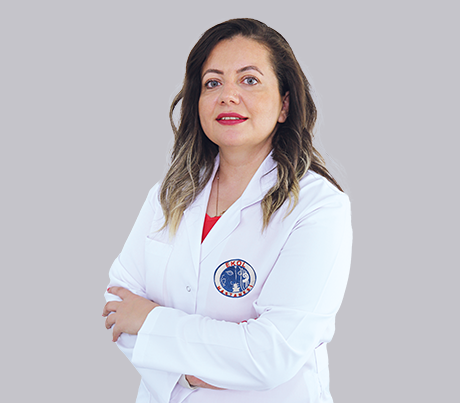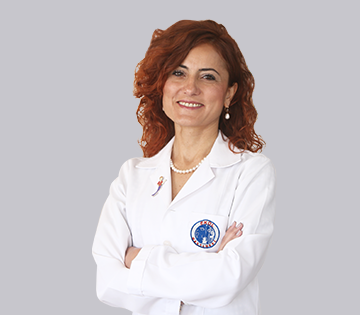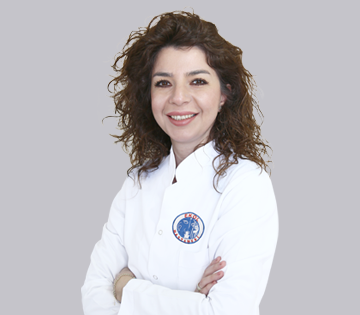Our Child Health and Diseases Department, led by our experienced doctors and their team, responds to the needs of our patients in the best possible way with a multidisciplinary working principle.
Developmental disorders are the mental and physical chronic disabilities that occur in childhood or adolescence. They start in the developmental period and last a lifetime. They can cause impairments in different areas like social, physical, learning, and emotional. Some of the developmental disorders are:
Some of the lower respiratory tract infections in children are:
Some of the upper respiratory tract infections in children are:
High fever is a very common condition in young children. In a couple of days, the body temperature usually returns to normal. A normal temperature in babies and children is 36.4 Celsius. If your child has a high fever:
You should keep them at home, give them plenty of liquids and check their conditions regularly. You should not cover them with many clothes and you should not give aspirin if they are under 16. Also, do not undress your child to cool them.
Urinary tract infections are quite common in children. A bacteria is known to cause that infection. Urinary tract infections are seen mostly in girls usually after toilet training begins. Uncircumcised boys under one year old are also at higher risk.
Some of the symptoms of urinary tract infections are; fever, vomiting, irritability, and poor appetite.
If the infection also affects the kidneys, the condition is more serious. Antibiotic treatment can prevent your child from kidney damage.
Diarrhea in children is a condition that children have watery stools several times during the day. If it lasts more than 24 hours, and your child has a fever too, you should call your child’s doctor as soon as possible.
Gastroenteritis in children is mostly caused by viruses. Rotavirus is the main factor that caused stomach flu in children. Vomiting and diarrhea are the most common symptoms of gastroenteritis in children. There is no specific treatment for gastroenteritis in children. Home rest and having lots of liquids can be very helpful in the recovery period.
A deep, chesty cough during the night is the main sign of allergic bronchitis in children. Your child may tell you that his or her chest hurts. Some other symptoms of allergic bronchitis are can be lined up as below:
Allergic bronchitis is chronic. Tobacco smoke, dust, and air pollution might cause allergic bronchitis.
Treatment of allergic bronchitis varies. Using a mist humidifier, exercises of breathing, flu and pneumonia vaccines, oxygen therapy, and taking steroids are among these treatments.
Hay fever is a specific type of allergic rhinitis. The “term” hay is referring haying season but hay fever can result from hay, pollution, grasses, and chemicals.
Some of the most common hay fever symptoms are:
Nasal steroid sprays, eye drops, wearing eyeglasses, and bathing after being outdoors might be helpful to treat hay fever. You should visit a doctor if your child has severe symptoms like difficulty breathing, fever, throat swelling, and dizziness.
Premature labor is the labor that happens before the 37th week of pregnancy. About 8 out of 100 babies are born prematurely. Twins and triplets are usually born prematurely.
Your medical experts check and monitor if your waters have broken and you are in labor. They also monitor if you have an infection. If your waters have broken, there is an infection risk for both your baby and you. You will be offered antibiotics and some tests for infections. If your waters have not broken, you might be offered a vaginal examination.
Asthma is one of the most common medical conditions among children in many countries in the world. It affects the airways and the tubes that carry air in and out of the lungs. Asthma is a long-term condition and in children can be dangerous, even life threatened. Only in a developed country like the UK, it is known that one million children are receiving treatment for asthma.
Some triggers of asthma are pollen, house dust, animal fur, and tobacco smoke. Difficulty breathing, coughing, wheezing, and breathlessness are among the symptoms of asthma. Using relievers and preventers will help to reduce some symptoms.
Eczema is a condition that the skin becomes red, dry, bumpy, and itchy. There are several types of eczema, the most common one is atopic “dermatitis”. The main symptoms of eczema are dry, itchy skin, but in babies, younger than one-year-old, eczema is seen on the cheeks, forehead, and scalp. It may spread to the knees.
There is no cure for eczema but treatment may reduce symptoms. Parents should make sure their children wear made of cotton clothes, drink plenty of liquids, and help them avoid stress which is a trigger of eczema.
An allergy is a response of the immune system to a foreign substance. Like adults, children and babies can have allergies to what they eat and where they touch. For an instant, detergent in clothes or home dust may cause allergies in children.
Some common types of allergy can be lined up as below:
If your child has any type of allergy, you should inform the school administration and share your plan to avoid risks.
 She graduated from Dicle University Faculty of Medicine in 2010. Between 2013 and 2018, he completed his residency at Dicle University Faculty of Medicine, Department of Child Health and Diseases.
Areas of interest:
• Neonatal and pediatric intensive care follow-up
• Emergency intervention and procedures in newborn children
• Premature (premature birth) child care and treatment
• Newborn follow-up and vaccinations
• Childhood diseases
• Child infectious diseases
• Respiratory system diseases in children (Bronchiolitis - Bronchitis - lung infections)
• All allergic diseases in children (cow milk protein allergies, food allergies, allergic asthma, skin allergies)
• Rash childhood diseases (Measles, rubella, chicken pox, etc.)
• Kidney diseases in children (Urine leakage, nephrotic syndrome)
• Recurrent urinary tract infections and urinary incontinence
• Follow-up of healthy children
• Growth-development retardation
• Obesity tracking
• Stomach, intestinal diseases and problems (Newborn and childhood reflux problems)
• Diarrhea diseases (summer diarrhea, infectious diarrhea, rotavirus and amoeba diarrhea)
• Immunization and vaccination follow-up in children
• Endocrine diseases in children (Thyroid disorders and blood sugar problems)
exp. Dr. Ümran Özmen has a good command of English.
She graduated from Dicle University Faculty of Medicine in 2010. Between 2013 and 2018, he completed his residency at Dicle University Faculty of Medicine, Department of Child Health and Diseases.
Areas of interest:
• Neonatal and pediatric intensive care follow-up
• Emergency intervention and procedures in newborn children
• Premature (premature birth) child care and treatment
• Newborn follow-up and vaccinations
• Childhood diseases
• Child infectious diseases
• Respiratory system diseases in children (Bronchiolitis - Bronchitis - lung infections)
• All allergic diseases in children (cow milk protein allergies, food allergies, allergic asthma, skin allergies)
• Rash childhood diseases (Measles, rubella, chicken pox, etc.)
• Kidney diseases in children (Urine leakage, nephrotic syndrome)
• Recurrent urinary tract infections and urinary incontinence
• Follow-up of healthy children
• Growth-development retardation
• Obesity tracking
• Stomach, intestinal diseases and problems (Newborn and childhood reflux problems)
• Diarrhea diseases (summer diarrhea, infectious diarrhea, rotavirus and amoeba diarrhea)
• Immunization and vaccination follow-up in children
• Endocrine diseases in children (Thyroid disorders and blood sugar problems)
exp. Dr. Ümran Özmen has a good command of English. She graduated from Ege University Faculty of Medicine in 1999. Between 2001-2005, İzmir Dr. She completed her specialty at Behçet Uz Pediatric Diseases and Surgery Training and Research Hospital.
Her areas of interest are; All Child Diseases High Fever in Children Developmental Disorders Lower and Upper Respiratory Tract Infections Urinary tract infection Allergic Asthma Fever Allergic Bronchitis Hayfever (Allergic Rhinitis) Prematurity Baby Tracking Asthma in Children Eczema in Children Robust Child Exam
Dr. Sabahat Derici, a mother of a child, speaks English fluently.
She graduated from Ege University Faculty of Medicine in 1999. Between 2001-2005, İzmir Dr. She completed her specialty at Behçet Uz Pediatric Diseases and Surgery Training and Research Hospital.
Her areas of interest are; All Child Diseases High Fever in Children Developmental Disorders Lower and Upper Respiratory Tract Infections Urinary tract infection Allergic Asthma Fever Allergic Bronchitis Hayfever (Allergic Rhinitis) Prematurity Baby Tracking Asthma in Children Eczema in Children Robust Child Exam
Dr. Sabahat Derici, a mother of a child, speaks English fluently. She graduated from Celal Bayar University Faculty of Medicine. She completed her specialization in Child Health and Diseases between 2013-2017. Being a mother of a child, Exp. Dr. Hülya Aydın speaks good English.
Areas of interest: All Child Diseases High Fever in Children Developmental Disorders Upper and Lower Respiratory Tract Infections Urinary tract infection Allergic Asthma Fever Allergic Bronchitis Hay Fever (Allergic Rhinitis) Prematurity Baby Tracking Asthma in Children Eczema in Children Intact Child Examination
She graduated from Celal Bayar University Faculty of Medicine. She completed her specialization in Child Health and Diseases between 2013-2017. Being a mother of a child, Exp. Dr. Hülya Aydın speaks good English.
Areas of interest: All Child Diseases High Fever in Children Developmental Disorders Upper and Lower Respiratory Tract Infections Urinary tract infection Allergic Asthma Fever Allergic Bronchitis Hay Fever (Allergic Rhinitis) Prematurity Baby Tracking Asthma in Children Eczema in Children Intact Child Examination